Dances for “wimmin only” became accepted events in the Valley as Lesbians were increasingly active in the Women’s Liberation Movement and, starting in 1974, began to create space for ourselves. They were very special events when the music was performed live by women’s bands. First the Deadly Nightshade and, then, Lilith provided the sound track for bashes and benefits.
I informally interviewed Lilith founder Beth Caurant for the first time in 1998 at her home in Northampton. She generously provided a written personal remembrance and some photographs of the band. In 2004 she commented on a brief draft by me of the band’s history. In 2015, when I started the blog, I sent her a dusty post draft that prompted her to write more. In the meantime she had been interviewed for JD Doyle’s Queer Music Heritage radio show broadcast in 2007, with many documents as well as music recordings made available online. This brief account of Lilith draws on these multiple sources.
Lilith founder Beth Caurant recollects that in the early 1970s it was unthinkable to play music professionally without having men in the band. “You could be a lead singer or perhaps a folk duo, but it was assumed that only men could play the drums or electric instruments.” One evening when she was having dinner in a restaurant in Amherst, she heard the Deadly Nightshade play for the first time, “Three women playing together without men— and they sounded great!”
Inspired to look for other women who might want to form a rock band with her, she went to the Valley Women’s Center in Northampton to put up a notice. She found one from two other lesbians already posted:”Looking to jam, play some music and drink a little wine.” She called them immediately and they did just that. “We all played guitar and sang, with beautiful harmonics, and one who could sing lead vocals. We decided on ‘Lilith’ as a name, as the woman who defied Adam.”
Their first gig, with a very limited repertoire, was in 1973 at a lesbian party in Wendell. For a year they rented a house together on Perkins Avenue in Northampton, gradually adding other musicians. Because there were so few female rock musicians, they became a band of whatever combination of vocalists/players were interested at the time. A clarinet player was added because she was willing to eventually play the saxophone that the band really wanted, but she wouldn’t join without her girlfriend, so a keyboard was added as well. At one point, when they needed a bass guitar, Beth’s girlfriend Tatty Hodge learned to play one from scratch.
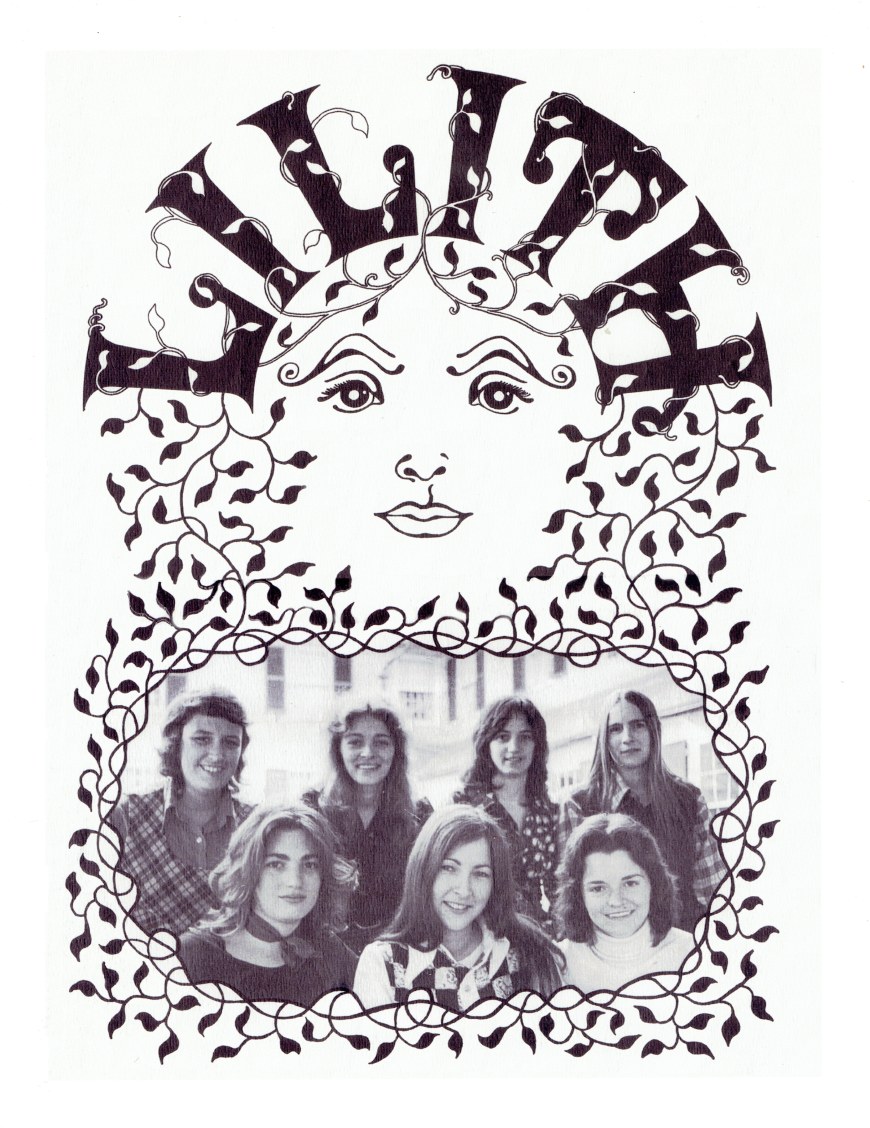
Beth has written that they were also very young and into the drinking, pot-smoking bar scene. By the time they cut their LP in 1978, Lilith had grown from a trio to a seven-member band and gone through thirty personnel changes, with only two of the original members remaining. In spite of internal chaos, Beth recalls that when the band’s playing was tight, it was really exciting.
At the beginning of their career, Lilith played for women’s dances at Smith and Mt. Holyoke Colleges. Valley women were treated to double the dance when both Lilith and the Deadly Nightshade played a benefit dance at UMass in 1974. Lilith played many of the same venues in the Valley as the Deadlies including the Vermont Bernardston Inn, but they also played Springfield’s gay Frontier Lounge and Arbor.
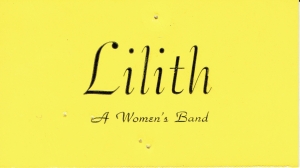
Most of the performance venues available, however, were straight bars and dance clubs. The band played repeatedly at The Rusty Nail in Hadley. Lilith became regulars at two Pleasant Street establishments in Northampton: the Saint Regis, a restaurant with a large dance room; and the Lazy River. At both places, the band drew a large following of local lesbians who mixed in with the other clientele without a problem, according to Beth.
Beth still remembers, however, that this practice of playing for lesbians at straight clubs and playing music by men (for its dance-ability) drew comment from one Northampton Lesbian Separatist, at least in fictional form. In her 1976 collection of poetry and short fiction They Will Know Me By My Teeth, Elana Dykewoman included a short story entitled, “Without Love”, which was the name of a Doobie Brothers song that Lilith covered. In the fictional account, a woman who lives down the street from a bar hears a women’s band play mostly men’s music where a “cluster” of lesbians dance. The women, the story implies, are trying to pretend that the men in the bar aren’t watching them, identifying them as lesbians, and preparing to stalk them when they leave the bar. This fiction reflects the history of increasing violence against lesbians in Northampton starting in 1975 as they became more visible in bars and on the streets and the issues being raised by local Lesbian Separatists.[More on these issues in future posts.]
Safer, more comfortable women-only venues were rare but welcome opportunities for women to gather and dance. Very early in their career, Lilith played at a private party at the Northampton Colonial Hilton thrown by a Smith College residential house. Such resources were most available to campus groups in the Valley. One of the largest women’s dances may have happened when Lilith played at a packed Blue Wall Cafe for the 1975 University Women’s Conference at UMass. The first of these live band wimmin-only dances for Northampton townies may not have occurred, however, until 1977.
With time, the band enlarged their playing circuit outside the Valley to include Boston. At the beginning of 1975, they provided the music for newly elected state representative Elaine Noble’s inaugural ball. She was the first openly gay candidate in the country to win a state office, representing Boston’s Fenway and Back Bay neighborhoods in the Massachusetts Legislature for two terms.

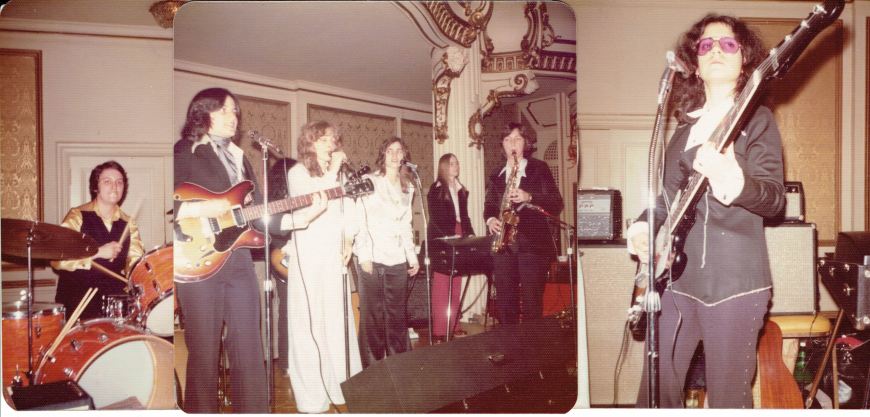
The band also played a Susan Saxe Defense Fund benefit in Boston at the Saints, a lesbian bar where they frequently played. Saxe was arrested in 1975 for alleged participation in a 1970 Weather Underground robberies of a Massachusetts armory and a bank, which involved the shooting death of a bank guard.
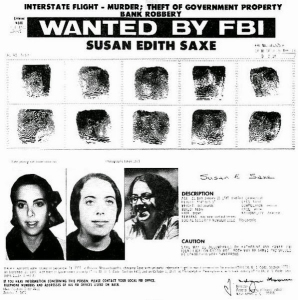
After her capture and arrest in Philadelphia, Saxe came out in feminist media as a lesbian and appealed to her “sisters” for support. Feminists and lesbians across the country did support her, including in the Valley, raising funds for her legal defense. After the Saints benefit in Boston, Beth Caurant believes the band came under investigation by the FBI. She says that men were seen taking photographs of her car and house and agents questioned her landlord about the band.
In 1975, Lilith cut a single demo 45rpm record, covers of Van Morrison’s “Moondance” and Jean Knight’s “Mr. Big Stuff”, to begin to promote themselves. Starting in 1976 the band began to get some critical mainstream press as they took their rock, soul, and swing north into Maine and south to Rhode Island and points in between.
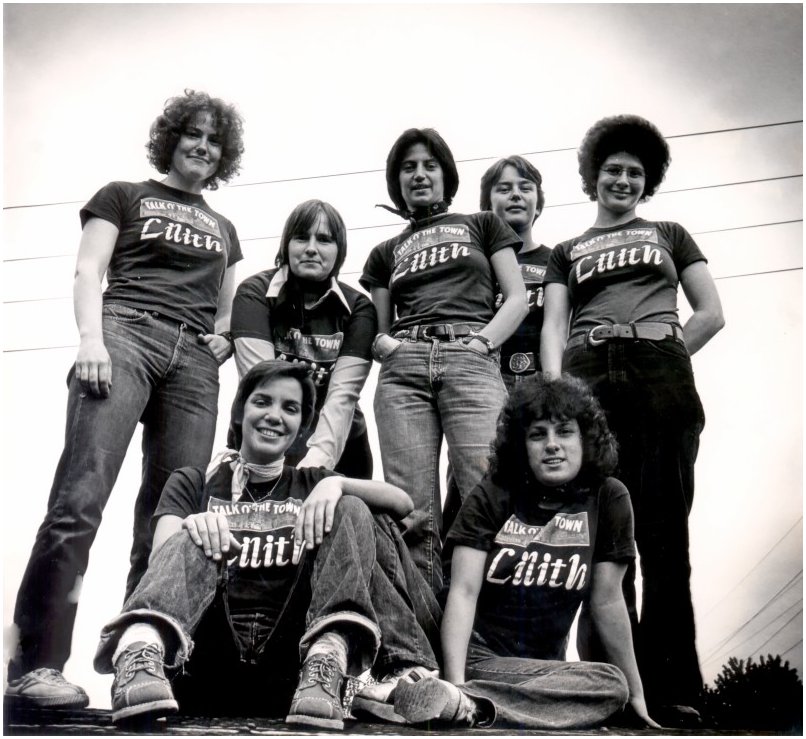
A newspaper review of their appearances in Hartford CT described them warming up the crowd with “Reggae Woman” disco-soul sound; moving more people onto the dance floor with “Money,” a pure disco sound, hard and bright; then to their cover of “Mr. Big Stuff.” Dancers rested while Joy Barone did a Janis Joplin–like “Total Blues,” then Marianna on sax surrounded Cathy and Lou’s vocals to send folks back up to the dance floor to bump and hustle. Reviewer Susan Rand Brown concluded in the Hartford Advocate, “Lilith is a whole band of rock musicians really doing it.”
Lilith spent the early six months of 1977 on an experimental southern tour. They embarked without a bassist or drummer, so they had to fill in along the way: Debbie Campbell, bass; Laurel Blanchard, drums. They added a new vocalist as well, Janice Warner. When they returned north, they settled in the Boston area with another new sound. The band that once again played at the Rusty Nail in Hadley was described by a male reviewer as “a middling-fair bar band playing cover versions of Stevie Wonder, bump and boogie of Wild Cherry, Pick Up the Pieces funk and the occasional ballad.” The Springfield Morning Union reviewer did note two original pieces, and wrote that the dance floor was two-thirds occupied by women couples.
In 1978, they released their first LP, “Boston Ride,” under the new Galaxia label. Two–thirds of the album was original music. The album was well received. Reviews made the mainstream as well as alternative press.
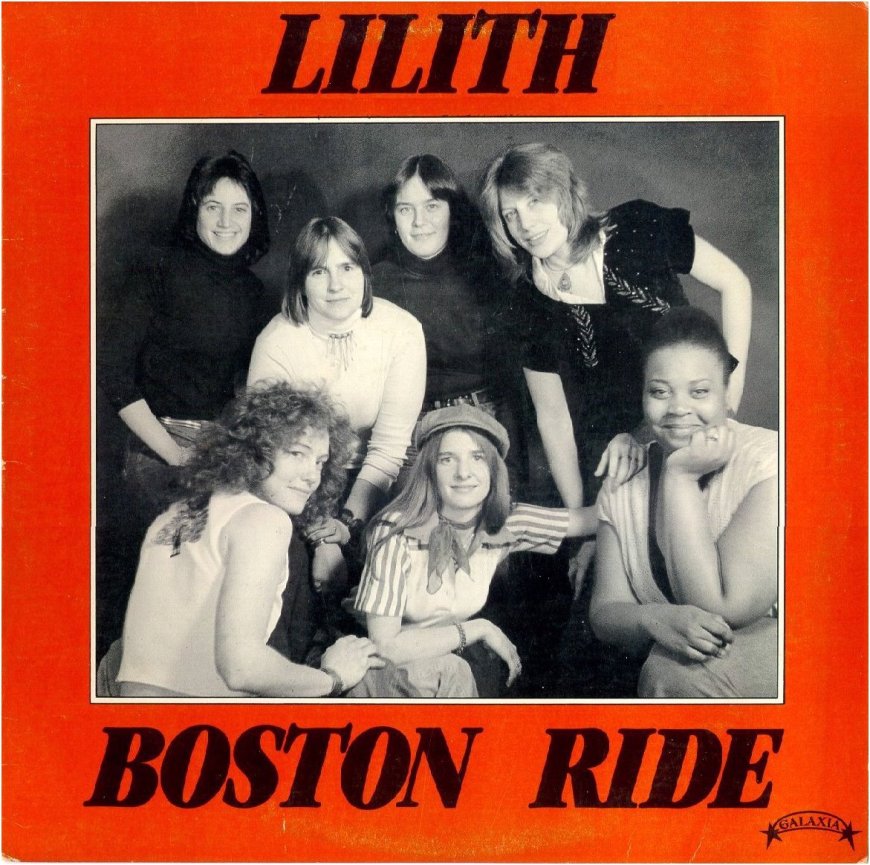
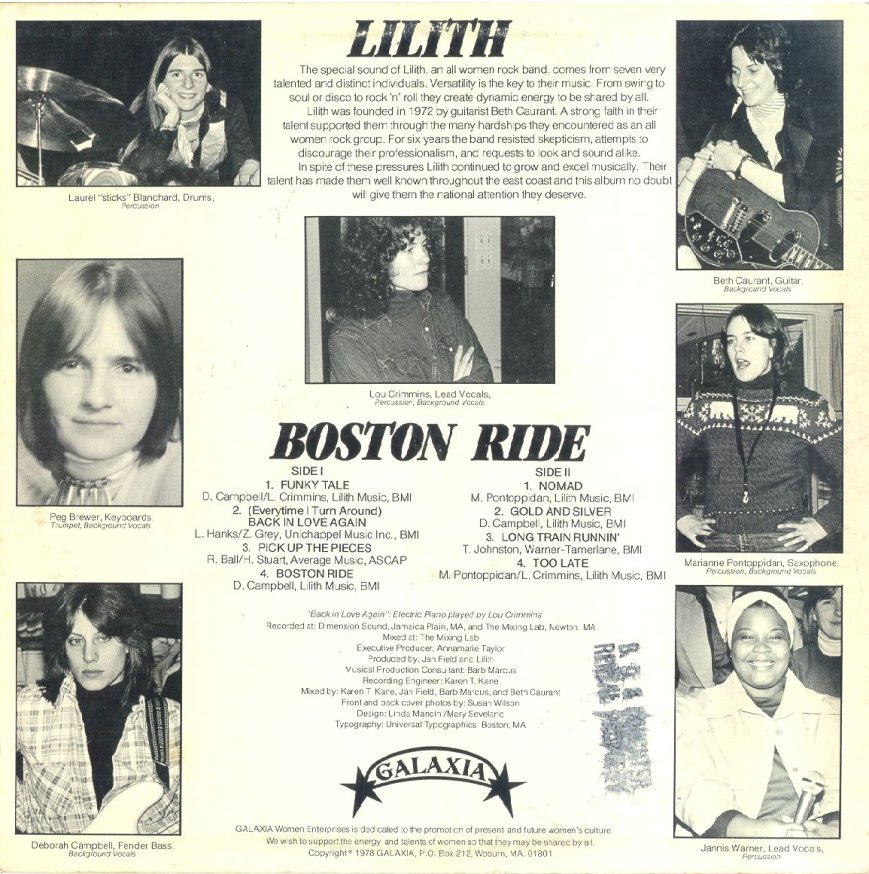
Despite high points such as opening for Bonnie Riatt, and good sales of the album, even in Europe, the high energy group couldn’t stay together past 1978. Karen Kane, the “Boston Ride” engineer, commented in a 2009 interview. ”The band (Lilith) dynamics were very hard and Beth and I basically mixed that album and made it happen. And now I listen to it and it’s like, hmmm, not too bad for 1978. You know it helped them, for a while, with their career, but they were having such terrible band dynamics that they didn’t last, unfortunately.”
Beth Caurant has still kept herself in music with women, a little bit, over the years. Most recently she appeared with the Girl Gang at Luthiers in Easthampton. After their show, she remarked to me on the number of old Lilith fans who attended and commented fondly on those old times that women danced together to music by women.
SOURCES:
__Caurant, Beth. Interviewed by Kaymarion Raymond, handwritten notes. Jan. 6, 1998.
__Caurant, Beth. Untitled [Lilith remembrance to Kaymarion private file.] Jan. 4, 1998.
__[Raymond,} Kaymarion and Letalien, Jacqueline, editors. The Valley Women’s Movement: A Herstorical Chronology 1968-1978. Ceres Inc. Northampton. 1978. Add linkMORE
__Caurant, Beth. Email correspondence with Kaymarion. May 14-30, 2004 and Nov 21-28, 2015.
__Nachman [Nachmon], Elana. They Will Know Me By My Teeth: stories and poems of lesbian struggle, celebration, and survival. Megaera Press. Northampton MA. 1976.
__Brown, Susan Rand. “Lilith: Rock and Role.” Hartford (CT) Advocate. Feb. 11, 1976.
__Danckert, Peter. “Lilith: Hunting Identity.” Morning Union, Springfield MA. Jul 29, 1977.
__Kane, Karen. Interview Queer Music Heritage.
May 2009.http://queermusicheritage.com/may2009s.html
__To hear some of Lilith’s music, read clippings, listen or read more of their history through an interview of Beth Caurant on Queer Music Heritage by JD Doyle follow these links below;
__Radio interview with Beth Caurant March 2007 by JD Doyle
http://www.queermusicheritage.com/mar2007.html
__ Transcript of Radio interview with Beth Caurant http://www.queermusicheritage.com/mar2007s.html
__Elaine Noble. http://outhistory.org/exhibits/show/out-and-elected/1970s/elaine-noble
A reader asks if the “Vermont gay club” mentioned might have been Andrew’s Inn in Bellows Falls rather than the Bernardston Inn. Anyone know?
LikeLike
We definitely played the Bernardston Inn a number of times around 1976 before we moved on to bigger gigs, don’t remember Andrew’s Inn. Beth
LikeLiked by 1 person
Ah yes- the good old Bernardston Inn where Zipper the dog sat on my birthday cake! Ha! Also- the Warwick
inn!!
LikeLiked by 2 people
I remember the Bernardston Inn. Those gigs we’re fun
PS: were we ever that young?
LikeLiked by 2 people
Jill Turner was one of the very early founding Lilith members. She was one of the two lesbians who had a notice up at the valley Women’s Center looking for women for a band.Beth finding their note was the beginning of Lilith. She died recently, a link to her obituary http://www.legacy.com/obituaries/gazettenet/obituary.aspx?pid=189827115
LikeLike
I was devastated to hear of the loss of Jill Turner. She was a true talent who helped me start Lilith around 1971 along with Belinda Starr. A gifted soul.
LikeLiked by 1 person
[…] Beth Caurant on Dancing Wimmin: Lilith, the… […]
LikeLike
Hi Beth. I was Debbie Campbell’s supervisor at Tufts Medical School, where she worked in the washroom cleaning lab ware. We became good friends. I was one of the men groupies that followed your band, when you played in straight nightclubs. To make a long story short, I finished Tufts in 1984 with a PhD, did medical research at MGH until 2005, then moved to Perth, Western Australia, retired in 2015 and settled in Tasmania (Australia’s island state). I was unpacking my LPs to set up my stereo system, and came across “Boston Ride” – autographed by every band member except you and Janice. It brought back fond memories. I’m glad to see that you are still blogging about the band’s ground-breaking history, and the discrimination you faced at the time. I am wondering what happened to Debbie, if you don’t mind sharing (we could go offline to Messenger or email if you wish). You all were very talented musicians and vocalists, and I’m disappointed that the band broke up after making your mark on history. Thanks to you, I now have a better understanding of those times.
LikeLike
Gerry, Wonderful to hear from you. My email is bcfrances@aol.com. Please send me yours so we can catch up and I’ll let you know where Debbie is. Beth
LikeLike
Worth reading a second time!
LikeLike
Is there any type of digital recording of “Boston Ride”? My ex and I hung out with the band a few times when they lived on Cambridge St. in Allston. My ex took the LP with him and he has since passed. This would have been around 1978. I was pregnant with our second child.
I have been looking for a recording or any info for the past 6-7 years. changed my query request and what do you know, I ended up here.
The funny thing is my ex thought it was funny that when we were hanging out with the band after a show at someone’s house and he was the only male there. The joke is on him after our divorce I met and later married my wife. We have been together 25 years.
Still looking for a digital recording if anyone knows of one. I would love to sit and listen again.
LikeLike
Janet, Listen to some in the Queer Music Heritage link listed in the sources, it is an archived radio show with music and interviews. Beth’s email is also in the comments if you want to query her.
LikeLike